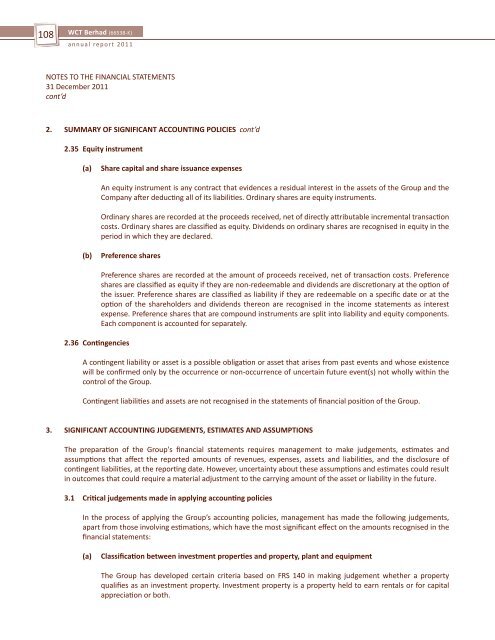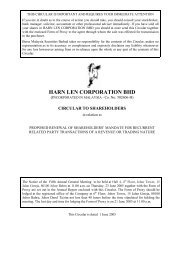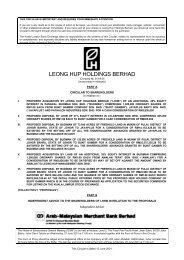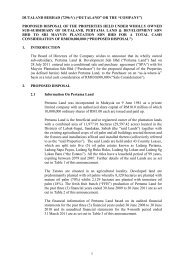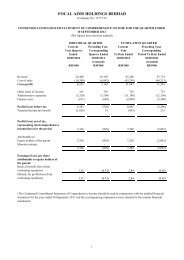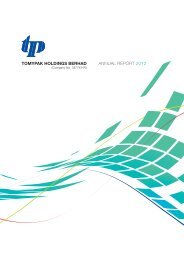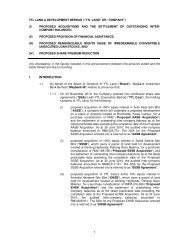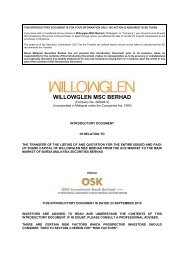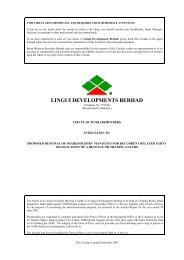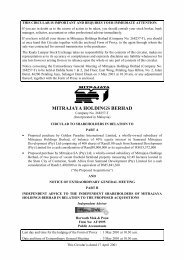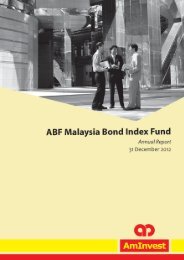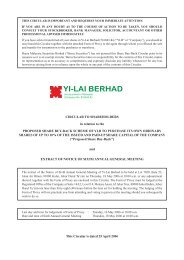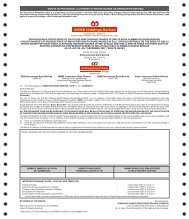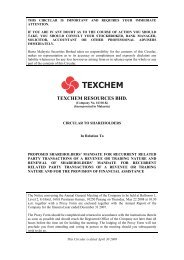WCT-Page 30 to ProxyForm (2.4MB).pdf - Announcements - Bursa ...
WCT-Page 30 to ProxyForm (2.4MB).pdf - Announcements - Bursa ...
WCT-Page 30 to ProxyForm (2.4MB).pdf - Announcements - Bursa ...
Create successful ePaper yourself
Turn your PDF publications into a flip-book with our unique Google optimized e-Paper software.
108<br />
<strong>WCT</strong> Berhad (66538-K)<br />
annual report 2011<br />
NOTES TO THE FINANCIAL STATEMENTS<br />
31 December 2011<br />
cont’d<br />
2. SUMMARY OF SIGNIFICANT ACCOUNTING POLICIES cont’d<br />
2.35 Equity instrument<br />
(a) Share capital and share issuance expenses<br />
An equity instrument is any contract that evidences a residual interest in the assets of the Group and the<br />
Company after deducting all of its liabilities. Ordinary shares are equity instruments.<br />
Ordinary shares are recorded at the proceeds received, net of directly attributable incremental transaction<br />
costs. Ordinary shares are classified as equity. Dividends on ordinary shares are recognised in equity in the<br />
period in which they are declared.<br />
(b) Preference shares<br />
2.36 Contingencies<br />
Preference shares are recorded at the amount of proceeds received, net of transaction costs. Preference<br />
shares are classified as equity if they are non-redeemable and dividends are discretionary at the option of<br />
the issuer. Preference shares are classified as liability if they are redeemable on a specific date or at the<br />
option of the shareholders and dividends thereon are recognised in the income statements as interest<br />
expense. Preference shares that are compound instruments are split in<strong>to</strong> liability and equity components.<br />
Each component is accounted for separately.<br />
A contingent liability or asset is a possible obligation or asset that arises from past events and whose existence<br />
will be confirmed only by the occurrence or non-occurrence of uncertain future event(s) not wholly within the<br />
control of the Group.<br />
Contingent liabilities and assets are not recognised in the statements of financial position of the Group.<br />
3. SIGNIFICANT ACCOUNTING JUDGEMENTS, ESTIMATES AND ASSUMPTIONS<br />
The preparation of the Group's financial statements requires management <strong>to</strong> make judgements, estimates and<br />
assumptions that affect the reported amounts of revenues, expenses, assets and liabilities, and the disclosure of<br />
contingent liabilities, at the reporting date. However, uncertainty about these assumptions and estimates could result<br />
in outcomes that could require a material adjustment <strong>to</strong> the carrying amount of the asset or liability in the future.<br />
3.1 Critical judgements made in applying accounting policies<br />
In the process of applying the Group’s accounting policies, management has made the following judgements,<br />
apart from those involving estimations, which have the most significant effect on the amounts recognised in the<br />
financial statements:<br />
(a) Classification between investment properties and property, plant and equipment<br />
The Group has developed certain criteria based on FRS 140 in making judgement whether a property<br />
qualifies as an investment property. Investment property is a property held <strong>to</strong> earn rentals or for capital<br />
appreciation or both.


